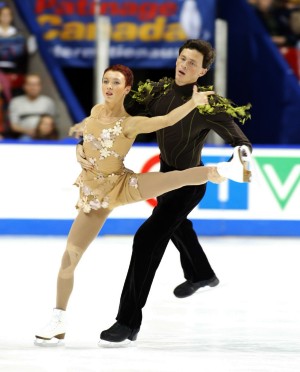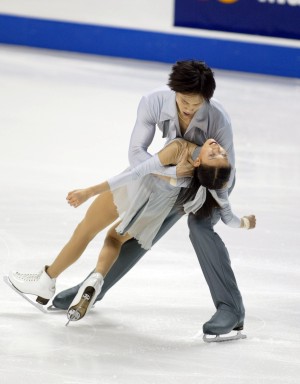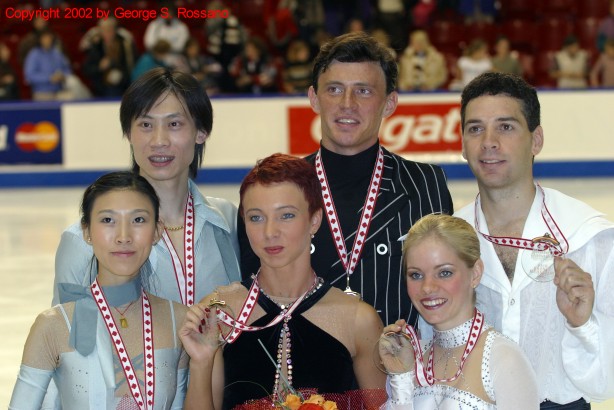|
The Colisee Pepsi is located on the outskirts of the city adjacent to a harness racing track where one could wager and get better odds than those the skaters are receiving from the new judging system in effect at this competition. The favorites on paper, Tatiana Totmianina and Maxim Marinin skated to Edvard Grieg’s "Morning Suite" and "In the Hall of the Mountain King" but failed to make the most of these contrasting pieces of music. Marinin fell on the triple toe loop and his free leg on the camel spin wobbled. An ugly squat entry by Totmianina marred the death spiral. Their usual lack of expression and pedestrian choreography made it a forgettable performance. The range of marks for required elements was 5.1-5.4 with overly generous presentation scores of 5.5-5.8. These were enough to secure them first place. The last minute entry of Kathryn Orscher and Garrett Lucash, fifth at 2002 U.S. Nationals, while beating out their second and third ranked compatriots could only manage a sixth place result. The throw triple Salchow covered a good distance but a unison error in the side-by-side spins spoiled that element. The pair spin was slow and their stroking and ice coverage is not up to the senior international level. Hopefully, working with Russian coach and former world champion Vadim Naumov will address and improve these shortcomings. Lucash admitted to the deficiencies stating, "We need to skate more aggressively and add more speed." He was one of the few skaters to directly address the scoring changes in effect at this competition. "I’m not crazy about it," he said, "I’d like to see who gave me what." "We have to focus on our own skating, it’s all we can control," he added. Qing Pang and Jian Tong of China appeared washed out clad in white outfits, which did little to contrast with their pale complexions and painfully thin physiques. During the throw Tong's feet came completely off the ice and one leg was raised so high into the air it was a wonder he didn’t lose his balance and fall. This flaw detracted from her strong execution of the throw triple Salchow. He traveled on the side-by-side spin and they were out of sync. The star lift with release was not as intricate as they could have demonstrated and her entry into the death spiral was weak. These errors were reflected in the scores for required elements, which ranged from 4.0-4.9 with presentation scores only slightly higher of 4.5-5.3. Still these were good enough to place them second in this portion of the event. Overall the showing by the U.S. entries was abysmal which doesn’t bode well for the future of this discipline. Given the recent four-year suspension handed down to Kyoko Ina, the U.S. is in a rebuilding mode and so far none of the pairs appear willing or able to step up to fill the void. Tiffany Scott and Philip Dulebohn, heirs apparent to the crown being vacated by Ina and John Zimmerman, are certainly capable of better than they demonstrated. Dulebohn fell out of the landing of the triple toe loop and put his hands to the ice. The lift done directly in front of the judges didn’t get over his shoulders and looked on the verge of complete collapse. Scott landed the throw triple Salchow but with a break at the waist and barely kept from touching her hands to the ice. On a more positive note their side-by-side spins were in unison with good speed and positioning, and her death spiral had nice stretch. However their errors left them in next to last place. Stephanie Kalesavich and Aaron Parchem failed to take advantage of their draw, with a fall on the throw triple Salchow. Kalesavich was tilting badly in the air and it was apparent she wouldn’t be able to hold the landing. They each marred the triple Salchow jump with a fall by Kalesavich and a fall out by Parchem. It was not unexpected, as they had difficulty with this element during the warm-up. The side by side spins were too far apart to be effective and the pair spin was quite slow. They did manage to end with two strong elements; the spiral sequence and a unique adaptation of positioning in the death spiral. Afterwards coach Mitch Moyer said the death spiral variation was put in to, "add variety and difficulty to the program." Kalesavich admitted to a case of nerves saying, "I tried a little too much out there tonight." Parchem added, "We need to get over it (the performance) and move on." Moyer summed it up by saying, "Today is the last day of October and tomorrow is the first of November." Hopefully by mentally wiping the slate clean the duo can concentrate on their free skate. Overall the Canadian entries skated at a much higher level. Valerie Marcoux and Craig Buntin have made an impressive debut onto the international scene. The new pairing already captured their first title at the Nebelhorn Trophy last month in Oberstdorf, Germany. The star lift with change of hands into another star position with flip out exit was very effective. The throw triple loop was landed but without any flow out. The spiral sequence could use more difficulty and a unison problem on the side by side spins caused them to lose speed but the program ended with a solid death spiral demonstrating a good entry and nicely arched position. The program of Jacinthe Lariviere and Lenny Faustino was well presented with comedic touches and good expression. A fall by Lariviere on the triple toe loop jump and a synchronization glitch on the side by side spins kept their marks for required elements down but ended up in fourth place. Afterwards Faustino said, "The program went great except for the mistake, our speed was up and we were even ahead of our music." Coming off a strong second place showing last week at Skate America, Anabelle Langlois and Patrice Archetto carried the momentum into Quebec City and demonstrated a solid skate that should have earned them higher placements from the judging panel. Their music selection of Duke Ellington’s, "Harlem Nocturne" suited them and was well presented. Langlois’s ankle injury did not appear to hamper them although Archetto later admitted to worrying about it but added, "I have to focus on my performance." Off ice Langlois keeps the foot taped to prevent any further damage to the injury but leaves it untapped when skating. Unlike the U.S. entries the Canadians appear ready and eager to fill the void left by the retirement from eligible competition of Canadian National and Olympic Champions, Jamie Sale and David Pelletier. Tomorrow we shall see if the U.S. competitors can regroup and compete with the rest of the field. |
||||||||||||||||||||||||||||||||||


